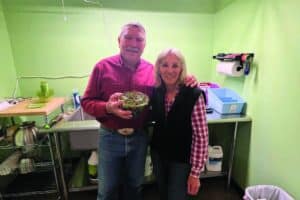Recycling is captivating to not only individuals but also local governments and businesses. Corporations and municipalities are experiencing the benefits economically and environmentally.Why recycle?The Environmental Protection Agency Web site states that currently 32 percent of waste is recycled in this country at “a rate that has almost doubled during the past 15 years.” There are hundreds of other resources and statistics on the Internet about recycling. But what should be recycled, and why is it important?The National Recycling Coalition site lists the following materials as the top 10 items to recycle:1. Aluminum2. PET (polyethylene terephthalate) plastic bottles3. Newspaper4. Corrugated cardboard5. Steel cans6. HDPE (high density polyethylene) plastic bottles7. Glass containers8. Magazines9. Mixed paper10. ComputersIs it worth the time and money to recycle? Many trash haulers charge for curbside pickup. Plus, it takes time to separate and drop off collected materials if no curbside service is available.When examining the effect recycling has on reducing greenhouse gases, the case becomes more difficult for not recycling. According to the EPA’s Web site, there are three ways solid waste disposal creates greenhouse gases: methane – “a greenhouse gas 21 times more potent than carbon dioxide” – is formed from the anaerobic decomposition of waste in landfills; carbon dioxide is formed when solid waste is burned, and it is produced by the vehicles used to transport the waste; and “the disposal of materials indicates that they are being replaced by new products,” which usually means fossil fuels are being used for the manufacturing of those products. Waste reduction and recycling helps limit these processes; thus, reducing the emissions of greenhouse gases.Local government and recyclingAlthough the types of waste removal systems in Colorado vary, recycling is a clear priority, and the demand for this service is growing every year.Recycling became a priority for the Colorado Legislature April 25 when Gov. Ritter signed into law House Bill 1220, which “establishes purchase preference for environmentally preferable products by government entities,” according to the 2007 Colorado General Assembly: Legislative Summary. The summary clarifies “environmentally preferable products” as products or services that “contain recycled content, minimize waste, conserve energy or water, reduce the amount of toxics disposed or consumed, and contain plant-based materials.”HB 1288 was signed by the governor on May 23, establishing the Sustainable Resource Economic Opportunity Commission, which collects landfill facility and tipping fees. The fees are then “allocated in the form of grants to promote the recycling industry and create markets for recycled goods,” the Legislative Summary states.Local governments also are trying to mitigate their environmental impact and focus on sustainability.Colorado Recycles, a nonprofit organization dedicated to providing comprehensive recycling resources for Colorado citizens, recently conducted a survey in collaboration with the Colorado Municipal League monitoring trash collection and curbside recycling programs across the state.According to ColoradoCurbside.com, a Web site dedicated to the survey’s findings, 17.4 percent of the municipalities surveyed reported they provide trash service as a municipal service like utilities; 16.2 percent reported providing the municipal service through a contract with private trash haulers; and 48.4 percent reported relying on privatization. The organizations received an 82 percent response rate from the 271 municipalities surveyed.El Paso County uses a privatized system, with residents choosing their own service provider, keeping prices for trash removal competitive. However, there are benefits to services provided by the city, such as a more stable recycling program, said Dick Brown, executive director of Colorado Recycles. Also, he said a city service “establishes a community value.” But the city is then responsible to educate and reeducate the public about the services.In 1997, the Governor’s Office of Energy Management and Conservation evaluated Colorado recycling programs to help establish challenges and successes from which other communities can learn. The following elements for a successful program were taken verbatim from the OEMC “Recycling in Colorado: What it takes to be Successful:”* Support from political boards, top managers and the community* Programs that set and implement obtainable goals* A recycling budget to run and operate the program* Program convenience for users* Educational and public relations outreachEl Paso County has an active recycling program. According to the El Paso County Household Chemical Waste Collection Facility 2006 Year in Review, the county government recycled 387,846 pounds of paper products through their commingled paper-recycling program. They also recycled 9,200 pounds of cardboard, 111 pounds of plastics and aluminum and 1,500 toner cartridges.Kathy Andrew of the El Paso County Solid Waste Management division said the county’s paper, plastic and aluminum materials are sent to Recycle America, a division of Waste Management. Toners are recycled at Office Max.The county organizes several community-based recycling programs as well. The county’s Solid Waste Management division held an “Electronic Recycling Day” May 19, collecting 38,277 lbs. of electronics from 314 customers, according to a June news release.The Solid Waste Management division also operates the Household Chemical Waste Collection Facility and supports other recycling operations like the Yard Waste Collection Program, the Treecycle Program and the Black Forest Slash/Mulch Wildfire Mitigation Program. According to the division’s 2006 Year in Review, the Black Forest program collected 27,366 cubic yards of slash and 9,102 cubic yards of mulch. More than 400 volunteers helped with this program, contributing 1,416 hours of labor.Colorado Springs Utilities organizes the city of Colorado Springs’ recycling program. Not all city departments participate in the program, said Cindey Arroyo of Colorado Springs Utilities. But the facilities department of the utilities company provides them with the means to collect paper and aluminum cans.”We also support cardboard recycling,” Arroyo said. “We do have several departments that on their own collect glass, plastic and tin cans. All of these items are handled by Recycle America once they hit the dumpsters outside.”There are no current statistics regarding the amount of recyclables collected between CSU and the city. “Separating out the pounds of recycle (materials) that is just from city and utility buildings is a challenge,” Arroyo said.Still, CSU’s e-waste recycling program collected 22 tons of electronic waste in 2006, said Rachel Beck, spokeswoman for CSU. They also collected nearly 16,000 mercury-containing lamps to be recycled.”We recycled 1.4 million pounds of steel, aluminum, copper and brass and 2,600 tons of fly-ash (a waste product from power plants) for re-use in construction,” Beck said.The only resource for recycling listed on the city’s Web site addresses hazardous waste. No community resources are provided for other recycling programs. City Councilman Darryl Glenn, representing northeast Colorado Springs, doesn’t believe a lack of resources is an issue. “The community should be responsible,” he said, for educating itself about recycling programs.In Part 2 of this recycling series, the NFH examines recycling among businesses and individuals.






